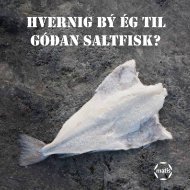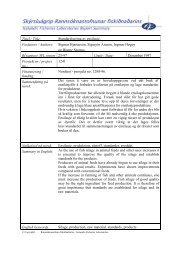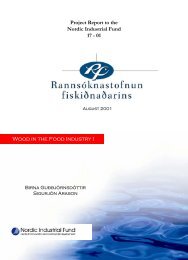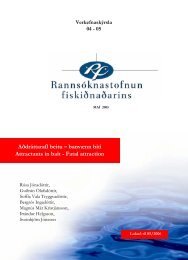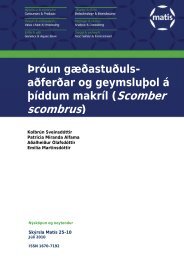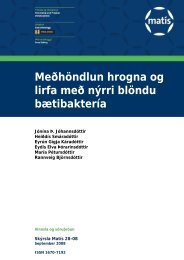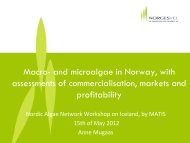Microbiology and Spoilage Trail in Nile Perch (Lates niloticus), Lake ...
Microbiology and Spoilage Trail in Nile Perch (Lates niloticus), Lake ...
Microbiology and Spoilage Trail in Nile Perch (Lates niloticus), Lake ...
You also want an ePaper? Increase the reach of your titles
YUMPU automatically turns print PDFs into web optimized ePapers that Google loves.
Table 6: Card<strong>in</strong>al temperature for microbial growth (Adams <strong>and</strong> Moss, 2008).<br />
Bacteria group M<strong>in</strong>imum Optimum Maximum<br />
Thermophile 40 - 45 o C 55 -75 o C 60 - 90 o C<br />
Mesophiles 5 - 15 o C 30 - 45 o C 35 - 47 o C<br />
Psychrophiles -5- +5 0 C 12 - 15 o C 15 - 20 o C<br />
Psychrotrophs -5- +5 0 C 25 - 30 0 C 30- 35 0 C<br />
(Adapted <strong>in</strong> ICMF, 1980: Card<strong>in</strong>al temperature for Prokaryotic Microorganisms)<br />
Mesophiles <strong>in</strong>clude human or animal pathogens <strong>and</strong> food spoilage bacteria. In favourable<br />
medium <strong>and</strong> at optimum growth temperature their generation time is ≤ 0.5 hr. The<br />
psychrophiles <strong>in</strong>clude all organisms that are capable to grow at 0 o C. The psychrotrophs are<br />
found at wider range of temperatures <strong>and</strong> <strong>in</strong> more diverse range of habitats <strong>and</strong> thus they<br />
are of greater importance <strong>in</strong> the spoilage of chilled foods. The psychrotrophs <strong>in</strong>clude gram-<br />
negative <strong>and</strong> gram- positive bacteria; aerobes, anaerobes, <strong>and</strong> facultative anaerobes, motile<br />
<strong>and</strong> non-motile organisms; spore formers <strong>and</strong> non-spore formers. Some psychrotrophs<br />
species among them at least 27 genera are listed <strong>in</strong> table 7. Yeast <strong>in</strong>cludes psychrotrophic<br />
stra<strong>in</strong>s <strong>in</strong> the genera C<strong>and</strong>ida, Torulopsis, Cryptococcus <strong>and</strong> Rhodotorola. Psychrotrophic<br />
molds are found <strong>in</strong> the genera Penicillium, Trichothecium <strong>and</strong> Aspergillus.<br />
Table 7: Genera that <strong>in</strong>clude psychrotrophic bacteria (ICMFS, 1980a)<br />
Ac<strong>in</strong>etobacter Aeromonas Alkaligens Athrobacter<br />
Bacillus Chromobacterium C<strong>in</strong>etobacter Clostridium<br />
Corynebacterium Enterobacter Erw<strong>in</strong>ia Escherichia<br />
Flavobacterium Klebsiella Lactobacillus Leuconostoc<br />
Listeria Microbacterium Micrococcus Moraxella<br />
Proteus Pseudomonas Serratia Streptococcus<br />
Streptomyces Vibrio Yers<strong>in</strong>ia<br />
2.5.1.1 Effect of storage at ambient <strong>and</strong> refrigeration temperature (0-25 ° C)<br />
The storage temperature of world fresh fishery/seafood products is <strong>in</strong> the range with<strong>in</strong> 0-<br />
25 o C, (Huss, 1995). In this range of temperature the microbiological activities are important<br />
<strong>in</strong> the shelf life <strong>and</strong> spoilage of fresh fish stored at chill conditions <strong>in</strong> melt<strong>in</strong>g ice<br />
approach<strong>in</strong>g 0 o C <strong>and</strong> at ambient temperature; warm/tropical countries from between 10–<br />
30 o C. However at temperature below 10 o C mesophilic bacteria do not grow <strong>and</strong><br />
20



